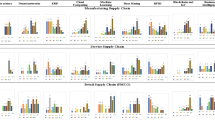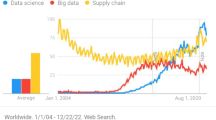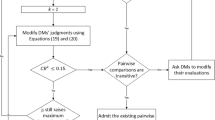Abstract
The study aims to propose a decision-making framework for prioritising solutions to overcome barriers to omnichannel adoption in logistics. An empirical case study has been carried out to assess the practicality and validity of this framework in the actual environment. The decision-making framework embraces an integrated approach comprising of fuzzy Delphi Method (FDM), fuzzy Analytic Hierarchy Process (FAHP) and fuzzy VlseKriterijumska Optimizacija I Kompromisno Resenje (FVIKOR) for capturing human thinking and subjectivity for doing evaluation and prioritisation of solutions. The proposed framework has been evaluated in an Indian apparel firm. The results suggest that the proposed framework can identify and prioritise the solutions of omnichannel adoption in logistics to overcome its barriers. The proposed framework relies on the well-structured knowledge and personal experience of potential experts to consider various fuzzy regions in the decision making. The present framework offers guidelines to practitioners for the successful adoption of omnichannel retailing regarding the identification and prioritisation of solutions to overcome the barriers of omnichannel adoption.




Similar content being viewed by others
References
Abdul, D., Wenqi, J., & Tanveer, A. (2022). Prioritization of renewable energy source for electricity generation through AHP-VIKOR integrated methodology. Renewable Energy, Pergamon, 184, 1018–1032.
Agarwal, S., & Singh, A. P. (2022). Performance evaluation of textile wastewater treatment techniques using sustainability index: an integrated fuzzy approach of assessment. Journal of Cleaner Production, Elsevier, 337, 130384.
Bai, C., & Sarkis, J. (2020). A supply chain transparency and sustainability technology appraisal model for blockchain technology. International Journal of Production Research, Taylor and Francis Ltd., 58(7), 2142–2162.
Banerjee, M. (2019). “Development of Omnichannel in India: Retail Landscape, Drivers and Challenges”, In Exploring Omnichannel Retailing (pp. 115–137). Springer.
Bell D., Gallino S. and Moreno A. (2014), “How to Win in an Omnichannel World”, MIT Sloan Management Review.
Boender, C. G. E., de Graan, J. G., & Lootsma, F. A. (1989). Multi-criteria decision analysis with fuzzy pairwise comparisons. Fuzzy Sets and Systems, North-Holland, 29(2), 133–143.
Bozbura, F. T., Beskese, A., & Kahraman, C. (2007). Prioritization of human capital measurement indicators using fuzzy AHP. Expert Systems with Applications, Pergamon, 32(4), 1100–1112.
Buckley, J. J. (1985). Fuzzy hierarchical analysis. Fuzzy Sets and Systems, North-Holland, 17(3), 233–247.
Büyüközkan, G., Havle, C. A., & Feyzioğlu, O. (2021). Digital competency evaluation of low-cost airlines using an integrated IVIF AHP and IVIF VIKOR methodology. Journal of Air Transport Management, Pergamon, 91, 101998.
Büyüközkan, G., Kahraman, C. and Ruan, D. (2007), ‘A fuzzy multi-criteria decision approach for software development strategy selection, Taylor & Francis GroupAbingdon, UK , Vol. 33(2–3):259–280.
Bowersox, D. J. and Closs, D. J. (2017). Logistical Management: The Integrated Supply Chain Process”, McGraw-hill, New Delhi, India.
Bueno, S., & Salmeron, J. L. (2008). Fuzzy modeling enterprise resource planning tool selection. Computing Stand. Interfaces, 30(3), 137–147.
Cao, L., & Li, L. (2018). Determinants of retailers’ cross-channel integration: an innovation diffusion perspective on omni-channel retailing. Journal of Interactive Marketing, 44, 1–16.
Cao, L. (2019). “Implementation of Omnichannel Strategy in the US Retail: Evolutionary Approach” In Exploring Omnichannel Retailing (pp. 47–69). Springer.
Chang, D. Y. (1996). Applications of the extent analysis method on fuzzy AHP. European Journal of Operational Research, North-Holland, 95(3), 649–655.
Chen, J. F., Hsieh, H. N., & Do, Q. H. (2015). Evaluating teaching performance based on fuzzy AHP and comprehensive evaluation approach. Applied Soft Computing, Elsevier, 28, 100–108.
Cheng, C. H. (1997). Evaluating naval tactical missile systems by fuzzy AHP based on the grade value of membership function. European Journal of Operational Research, North-Holland, 96(2), 343–350.
Chen, Y., Cheung, C. M., & Tan, C. W. (2018). Omnichannel business research: opportunities and challenges. Decision Support System, 109, 1–4.
Chiou, H. K., Tzeng, G. H. (2001) Fuzzy hierarchical evaluation with grey relation model of green engineering for industry. International Journal of Fuzzy Systems, 3(3), 466–475.
Chopra, S. (2016). How omni-channel can be the future of retailing. Decision, 43(2), 135–144.
Chuang, M., Yang, Y. S., & Lin, C. T. (2009). Production technology selection: deploying market requirements, competitive and operational strategies, and manufacturing attributes. International Journal of Computer Integrated Manufacturing, 22(4), 345–355.
Cotarelo, M., Calderón, H., & Fayos, T. (2021). A further approach in omnichannel LSQ, satisfaction and customer loyalty. International Journal of Retail and Distribution Management. https://doi.org/10.1108/IJRDM-01-2020-0013
Cook, G. (2014). Customer experience in the omni-channel world and the challenges and opportunities this presents. Journal of Direct, Data and Digital Marketing Practice, 15(4), 262–266.
Davis-Sramek, B., Ishfaq, R., Gibson, B. J., & Defee, C. (2020). Examining retail business model transformation: a longitudinal study of the transition to omnichannel order fulfillment. International Journal of Physical Distribution and Logistics Management, Emerald Group Holdings Ltd., 50(5), 557–576.
Deveci, M., Simic, V., Karagoz, S., & Antucheviciene, J. (2022). An interval type-2 fuzzy sets based Delphi approach to evaluate site selection indicators of sustainable vehicle shredding facilities’. Applied Soft Computing, 12, 108465.
de Borba, J. L. G., de Magalhães, M. R., Filgueiras, R. S., & Bouzon, M. (2021). Barriers in omnichannel retailing returns: a conceptual framework. International Journal of Retail and Distribution Management, Emerald Group Holdings Ltd., 49(1), 121–143.
Ebrahimi, S., & Bridgelall, R. (2021). A fuzzy Delphi analytic hierarchy model to rank factors influencing public transit mode choice: a case study. Research in Transportation Business & Management, Elsevier, 39, 100496.
Fu, X., Zhu, Q., & Sarkis, J. (2012). Evaluating green supplier development programs at a telecommunications systems provider. International Journal of Production Economics, 140(1), 357–367.
Galipoglu, E., Kotzab, H., Teller, C., Yumurtaci Hüseyinoglu, I. Ö., & Pöppelbuß, J. (2018). Omni-channel retailing research–state of the art and intellectual foundation. International Journal of Physical Distribution & Logistics Management, 48(4), 365–390.
Gao, W., Fan, H., Li, W., & Wang, H. (2021). Crafting the customer experience in omnichannel contexts: the role of channel integration. Journal of Business Research., 126, 12–22.
Golden, B. L. and Wang, Q. (1989), An alternate measure of consistency. In The Analytic Hierarchy Process. Springer, Berlin, Heidelberg. pp. 68–81
Govindarajan, A., Sinha, A. and Uichanco, J. (2017) Inventory optimisation for fulfillment integration in omnichannel retailing, working paper, Ross School of Business, University of Michigan, Ann Arbor, MI.
Gupta, A. and Singh, R.K. and Mangla, S. K. (2021), Evaluation of logistics providers for sustainable service quality: analytics based decision making framework, Annals of Operations Research, pp. 1–48.
Gul, M., Celik, E., Aydin, N., Taskin Gumus, A., & Guneri, A. F. (2016). A state of the art literature review of VIKOR and its fuzzy extensions on applications. Applied Soft Computing, Elsevier, 46, 60–89.
Hübner, A., Wollenburg, J., & Holzapfel, A. (2016). Retail logistics in the transition from multichannel to omni-channel. International Journal of Physical Distribution & Logistics Management, 46(6/7), 562–583.
Hsu, Y.-L., Lee, C.-H., & Kreng, V. B. (2010). application of fuzzy Delphi method and fuzzy AHP in lubricant regenerative technology selection. Expert Systems with Applications, 37(4), 19–25.
Ishfaq, R., Defee, C. C., Gibson, B. J., & Raja, U. (2016). Realignment of the physical distribution process in omni-channel fulfilment. International Journal of Physical Distribution & Logistics Management, 46(6/7), 543–561.
Ishikawa, A., Amagasa, M., Shiga, T., Tomizawa, G., Tatsuta, R., & Mieno, H. (1993). The max-min Delphi method and fuzzy Delphi method via fuzzy integration. Fuzzy Sets and Systems, North-Holland, 55(3), 241–253.
Kang, J. Y. M. (2019). What drives omnichannel shopping behaviors? fashion lifestyle of social-local-mobile consumers. Journal of Fashion Marketing and Management: an International Journal, 23(2), 224–238.
Karam, A., Hussein, M., & Reinau, K. H. (2021). Analysis of the barriers to implementing horizontal collaborative transport using a hybrid fuzzy Delphi-AHP approach. Journal of Cleaner Production, Elsevier, 321, 128943.
Karami, S., Ghasemy Yaghin, R. and Mousazadegan, F. (2020), ‘Supplier selection and evaluation in the garment supply chain: an integrated DEA–PCA–VIKOR approach’, https://doi.org/10.1080/00405000.2020.1768771, Taylor & Francis, Vol. 112 No. 4, pp. 578–595.
Larke, R., Kilgour, M., & O’Connor, H. (2018). Build touchpoints and they will come: transitioning to omnichannel retailing. International Journal of Physical Distribution & Logistics Management, 48(4), 465–483.
Liou, J. J. H., Tsai, C. Y., Lin, R. H., & Tzeng, G. H. (2011). A modified VIKOR multiple-criteria decision method for improving domestic airlines service quality. Journal of Air Transport Management, Pergamon, 17(2), 57–61.
Liu, Y., Eckert, C. M., & Earl, C. (2020). A review of fuzzy AHP methods for decision-making with subjective judgements. Expert Systems with Applications, Pergamon, 161, 113738.
Lin, R. J. (2013). Using fuzzy DEMATEL to evaluate the green supply chain management practices. Journal of Cleaner Production, 40(1), 32–39.
Mandal, P., Basu, P., & Saha, K. (2021). Forays into omnichannel: an online retailer’s strategies for managing product returns. European Journal of Operational Research., 292(2), 633–651.
Marchet, G., Melacini, M., Perotti, S., Rasini, M., & Tappia, E. (2018). Business logistics models in omni-channel: a classification framework and empirical analysis. International Journal of Physical Distribution & Logistics Management, 48(4), 439–464.
Melacini, M., Perotti, S., Rasini, M., & Tappia, E. (2018). E-fulfilment and distribution in omni-channel retailing: a systematic literature review. International Journal of Physical Distribution & Logistics Management, 48(4), 391–414.
Melero, I., Sese, F. J. and Verhoef, P. (2016), “Recasting the customer experience in today’s omni-channel environment”, UCJC Business and Society Review (formerly known as Universia Business Review), Vol.50, pp. 18–37.
Mishra, R. (2020). An analysis of factors influencing omnichannel retailing adoption using ISM-DEMATEL approach: An Indian perspective. International Journal of Retail & Distribution Management.
Mishra, R. (2021). A hybrid multi-criteria decision-making approach to assess the enablers of manufacturing flexibility under fuzzy environment. International Journal of Quality and Reliability Management, Emerald Group Holdings Ltd., 38(4), 955–985.
Mishra, R., Singh, R. K., & Koles, B. (2021). Consumer decision-making in omnichannel retailing: literature review and future research agenda. International Journal of Consumer Studies, Blackwell Publishing Ltd, 45(2), 147–174.
Mosquera, A., Olarte-Pascual, C., Juaneda Ayensa, E., & Sierra Murillo, Y. (2018). The role of technology in an omnichannel physical store: assessing the moderating effect of gender. Spanish Journal of Marketing-ESIC, 22(1), 63–82.
Opricovic, S. (2011). Fuzzy VIKOR with an application to water resources planning. Expert Systems with Applications, 38(10), 12983–12990.
Ostrom, A. L., Parasuraman, A., Bowen, D. E., Patricio, L., & Voss, C. A. (2015). Service research priorities in a rapidly changing context. Journal of Service Research, 18(2), 127–159.
Ou Yang, Y.P., Shieh, H.M., Leu, J. Der and Tzeng, G.H. (2011), A Vikor-Based Multiple Criteria Decision Method For Improving Information Security Risk, World Scientific Publishing Company , 8(2), 267–287.
Padilla-Rivera, A., Do Carmo, B. B. T., Arcese, G., & Merveille, N. (2021). Social circular economy indicators: Selection through fuzzy delphi method. Sustainable Production and Consumption, 26, 101–110.
Panahifar, F., Byrne, P. J., & Heavey, C. (2015). A hybrid approach to the study of CPFR implementation enablers. Production Planning & Control, 26(13), 1090–1109.
Prabhuram, T., Rajmohan, M., Tan, Y., & Robert Johnson, R. (2020). Performance evaluation of omni channel distribution network configurations using multi criteria decision making techniques. Annals of Operations Research, 288(1), 435–456.
Picot-Coupey, K., Huré, E., & Piveteau, L. (2016). Channel design to enrich customers’ shopping experiences: Synchronising clicks with bricks in an omni-channel perspective–the direct optic case. International Journal of Retail & Distribution Management, 44(3), 336–368.
Ortiz-Barrios, M., Cabarcas-Reyes, J., Ishizaka, A., Barbati, M., Jaramillo-Rueda, N., & de Jesús Carrascal-Zambrano, G. (2020). A hybrid fuzzy multi-criteria decision-making model for selecting a sustainable supplier of forklift filters: a case study from the mining industry. Annals of Operations Research, pp. 1–39.
Ramanayaka, K. H., Chen, X., & Shi, B. (2019). Application of extent analysis FAHP to determine the relative weights of evaluation indices for library website usability acceptance model. IET Software, the Institution of Engineering and Technology, 13(1), 86–95.
Ramavandi, B., Darabi, A. H., & Omidvar, M. (2021). Risk assessment of hot and humid environments through an integrated fuzzy AHP-VIKOR method. Stochastic Environmental Research and Risk Assessment, 35(12), 2425–2438.
Rosenmayer, A., McQuilken, L., Robertson, N., & Ogden, S. (2018). Omni-channel service failures and recoveries: refined typologies using Facebook complaints. Journal of Services Marketing, 32(3), 269–285.
Rodriguez, A. R. S. C., & De Oliveira, P. V. (2022). An extension of systematic layout planning by using fuzzy AHP and fuzzy VIKOR methods: a case study. European Journal of Industrial Engineering, Inderscience Publishers, 16(1), 1–30.
Sanders, M., Parekh, K., Kang, H., Kamel, M-A and Cheng, J. (2018). “The Future of Retail: Asia’s Ecosystems, available at https://www.bain.com/about/media-center/press-releases/2019/future-of-retail-at-shoptalk/ (Accessed on 7th January 2019)
Song, G., Song, S., & Sun, L. (2019). Supply chain integration in omni-channel retailing: a logistics perspective. The International Journal of Logistics Management., 30(2), 527–548.
Tahriri, F., Mousavi, M., Hozhabri Haghighi, S., & Dawal, Z. M. (2014). The application of fuzzy Delphi and fuzzy inference system in supplier ranking and selection. Journal of Industrial Engineering International. https://doi.org/10.1007/s40092-014-0066-6
Teng, J. Y., Huang, W. C., & Lin, M. C. (2010). Systematic budget allocation for transportation construction projects: A case in Taiwan. Transportation, 37(2), 331–361.
Vahdani, B., Mousavi, S. M., Hashemi, H., Mousakhani, M., & Tavakkoli-Moghaddam, R. (2013). A new compromise solution method for fuzzy group decision-making problems with an application to the contractor selection. Engineering Applications of Artificial Intelligence, Pergamon, 26(2), 779–788.
van Laarhoven, P. J. M., & Pedrycz, W. (1983). A fuzzy extension of Saaty’s priority theory. Fuzzy Sets and Systems, North-Holland, 11(1–3), 229–241.
Verhoef, P. C., Kannan, P. K., & Inman, J. J. (2015). From multichannel retailing to omni-channel retailing: introduction to the special issue on multichannel retailing. Journal of Retailing, 91(2), 174–181.
Wang, Y. M., Luo, Y., & Hua, Z. (2008). On the extent analysis method for fuzzy AHP and its applications. European Journal of Operational Research, North-Holland, 186(2), 735–747.
Wei, Y., & Li, F. (2020). Omnichannel supply chain operations for luxury products with conspicuous consumers. Transportation Research Part E: Logistics and Transportation Review, Elsevier Ltd, 137, 101918.
Wiener, M., Hoßbach, N., & Saunders, C. (2018). Omnichannel businesses in the publishing and retailing industries: Synergies and tensions between coexisting online and offline business models. Decision Support Systems, 109, 15–26.
Wollenburg, J., Holzapfel, A., Hübner, A., & Kuhn, H. (2018). Configuring retail fulfillment processes for omni-channel customer steering. International Journal of Electronic Commerce, 22(4), 540–575.
Ye, Y., Lau, K. H., & Teo, L. K. Y. (2018). Drivers and barriers of omni-channel retailing in China: A case study of the fashion and apparel industry. International Journal of Retail & Distribution Management, 46(7), 657–689.
Yucesan, M., & Gul, M. (2019). Hospital service quality evaluation: an integrated model based on pythagorean fuzzy AHP and fuzzy TOPSIS. Soft Computing, 24(5), 3237–3255.
Zhang, X. and Lam, J.S.L. (2019), ‘A fuzzy Delphi-AHP-TOPSIS framework to identify barriers in big data analytics adoption: case of maritime organizations, Routledge, Vol. 46 No. 7, pp. 781–801.
Zhang, M., Ren, C., Wang, G. A., & He, Z. (2018). The impact of channel integration on consumer responses in omni-channel retailing: the mediating effect of consumer empowerment. Electronic Commerce Research and Applications, 28, 181–193.
Zhu, G. N., Ma, J., & Hu, J. (2022). A fuzzy rough number extended AHP and VIKOR for failure mode and effects analysis under uncertainty. Advanced Engineering Informatics, Elsevier, 51, 101454.
Author information
Authors and Affiliations
Corresponding author
Additional information
Publisher's Note
Springer Nature remains neutral with regard to jurisdictional claims in published maps and institutional affiliations.
Rights and permissions
About this article
Cite this article
Mishra, R., Singh, R.K. & Mani, V. A hybrid multi criteria decision-making framework to facilitate omnichannel adoption in logistics: an empirical case study. Ann Oper Res 326, 685–719 (2023). https://doi.org/10.1007/s10479-022-04823-z
Accepted:
Published:
Issue Date:
DOI: https://doi.org/10.1007/s10479-022-04823-z




